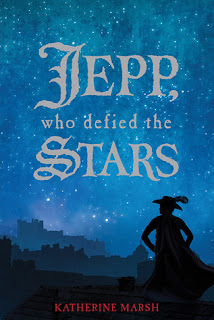Jepp, Who Defied the Stars
Jepp, Who Defied the Stars, is an enchanting young adult novel that gives us a great hero and a lesson that, though it may be familiar, should never be forgotten--our pasts don't make us who we are, and nothing is fated; we have free will.
The title character is a dwarf in the Spanish Netherlands (Holland) at the end of the sixteenth century. He lives a simple but happy life with his mother in her inn in a small town. His only problem is that he obsesses about who his father is, as his mother won't tell him.
One day, when he is fifteen, a representative of the court comes and takes him there to be in service to the Infanta in Brussels (as I learned in The Mill and the Cross, Spain ruled over the low countries in those day). As was the case for dwarfs in those days (and in a certain manner, still today), they are used for the amusement of others. Jepp is costumed and pops out of a pie, and the dwarf he falls in love with, Lia, sings in a cage. Dignity is not a thing easily found for little people.
After a tragedy, Jepp is taken to Denmark to serve Tycho Brahe, a real historical figure. He was an astronomer who was able to map many stars, pre-telescope. Jepp at first is simply a jester and servant: "'Jepp, your labors start now," he says to me in Dutch. 'Pick up my nose.'" (Brahe lost part of his nose in a duel and wore a prosthesis that frequently came loose). Eventually Jepp shows his intelligence, (he speaks Latin) so Brahe puts him to work in the library, aiding the scholars. He meets Brahe's daughter, Magdalene, a spirited young woman who creates astrological charts.
The issue of astrology runs all through the book. Though Magdalene believes strongly in the stars, she tries to impress upon Jepp that they are only a guide, not an absolute. But Jepp is certain he has to find out who he is by finding his father, and he returns to him home town, and then to the court, and numerous twists are introduced. Some of them have the auro of melodrama, but Katherine Marsh has given Jepp a strong enough voice to keep things interesting.
The most interesting part of the book is the middle third, when Jepp is at Brahe's castle called Uraniborg, where science is at his most advanced. Jepp says, "What I first took to be sorcery is actually science, man's own magic." His most important lesson comes at the end: "I must believe Magdalene--that the stars are not everything, that my actions can alter my destiny."
This book would be ideal for young teens who show an interest in astronomy, or history, or just want to read a good adventure.
The title character is a dwarf in the Spanish Netherlands (Holland) at the end of the sixteenth century. He lives a simple but happy life with his mother in her inn in a small town. His only problem is that he obsesses about who his father is, as his mother won't tell him.
One day, when he is fifteen, a representative of the court comes and takes him there to be in service to the Infanta in Brussels (as I learned in The Mill and the Cross, Spain ruled over the low countries in those day). As was the case for dwarfs in those days (and in a certain manner, still today), they are used for the amusement of others. Jepp is costumed and pops out of a pie, and the dwarf he falls in love with, Lia, sings in a cage. Dignity is not a thing easily found for little people.
After a tragedy, Jepp is taken to Denmark to serve Tycho Brahe, a real historical figure. He was an astronomer who was able to map many stars, pre-telescope. Jepp at first is simply a jester and servant: "'Jepp, your labors start now," he says to me in Dutch. 'Pick up my nose.'" (Brahe lost part of his nose in a duel and wore a prosthesis that frequently came loose). Eventually Jepp shows his intelligence, (he speaks Latin) so Brahe puts him to work in the library, aiding the scholars. He meets Brahe's daughter, Magdalene, a spirited young woman who creates astrological charts.
The issue of astrology runs all through the book. Though Magdalene believes strongly in the stars, she tries to impress upon Jepp that they are only a guide, not an absolute. But Jepp is certain he has to find out who he is by finding his father, and he returns to him home town, and then to the court, and numerous twists are introduced. Some of them have the auro of melodrama, but Katherine Marsh has given Jepp a strong enough voice to keep things interesting.
The most interesting part of the book is the middle third, when Jepp is at Brahe's castle called Uraniborg, where science is at his most advanced. Jepp says, "What I first took to be sorcery is actually science, man's own magic." His most important lesson comes at the end: "I must believe Magdalene--that the stars are not everything, that my actions can alter my destiny."
This book would be ideal for young teens who show an interest in astronomy, or history, or just want to read a good adventure.



Comments
Post a Comment